-

新人教版高中英语必修3Unit 1 Festivals and Celebrations-Listening &Speaking&Talking教学设计
The theme of this section is “Talk about festival activities and festival experiences”.Festival and holiday is a relaxing and interesting topic for students. This part talks about the topic from the daily life of students’. In the part A ---Listening and Speaking, there are three conversations among different speakers from three countries(Japan, Rio and China), where the speakers are participating in or going to participate in the festivals and celebrations. So listening for the relationship among them is a fundamental task. Actually, with the globalization and more international communication, it is normal for Chinese or foreigners to witness different festivals and celebrations in or out of China. In the Conversation 1, a foreign reporter is interviewing a Japanese young girl who just had participated in the ceremony of the Coming-of-Age Day on the street and asking her feeling about the ceremony and the afterwards activities. Conversation 2, Chinese girl Li Mei is witnessing the Rio Carnival for the first time, and her friend Carla gives her some advice on the costumes which enables her to match with the carnival to have a good time. Conversation 3, a Chinese guide is showing a group of foreign visitors around the Lantern Festival and introducing the customs of the festival to them. The three conversations have a strong vitality and insert the festival and cultural elements from different countries. So perceiving the festivals and cultures from different countries is the second task. At the same time, the scripts also insert the targeted grammar --- v-ing as attributive and predicative, which students can perceive and experience in a real context and make a road for the further study. That is the third task. In the Part B--- Listening and Talking, the theme is “Talk about festival experience”, which is the common topic in our daily conversations. During the conversation, Song Lin, a Chinese student, asked Canadian friend Max about how to spend Christmas. In the conversation, Song Lin talked about experience and the feelings during the Chinese Spring Festival, during which there are not only some enjoyable things but some unpleasant things. After the listening, perhaps students find there are some similarities between Christmas and the Chinese Spring Festival as there are some differences in the origins and celebrations. For example, people always visit friends and relatives, decorate their houses, have a big dinner together, chat and give presents to each other.

新人教版高中英语必修3Unit 2 Morals and Virtues-Discovering Useful Structure教学设计
1. 表示时间。Hearing these stories, I’m skeptical about the place. = When I heard these stories. . . 2. 表示原因。Not knowing his address, I can’t send this book to him. = Because/Since/As I don’t know his address. . . 3. 表示结果。His father died, leaving him a lot of money. =. . . and left him a lot of money4. 表示条件。Going straight down the road, you will find the department store. = If you go straight down the road. . . 5. 表示让步。Being tired, they went on working. =Although they were tired. . . 6. 表示行为方式、伴随情况或补充说明。He lay on the grass, staring at the sky for a long time. =. . . and stared at the sky for a long time注意:非谓语动词作状语时, 如所提供的动词不能和句子中的主语保持一致, 动词-ing形式必须有自己的逻辑主语, 通常由名词或代词来担任, 这就是独立主格结构。The last bus having gone, we had to walk home. (having gone的逻辑主语是the last bus, 而不是we)Weather permitting, the football match will be played on Friday. (permitting的逻辑主语是time, 而不是the football match)Step 7 Practice1. ________(study) hard, you are sure to get first prize. 2. People use plastic in their daily life, _______(leave) large amounts of waste. 3. ________(work) hard at your lessons, you are to succeed. 4. The old man, ____________(work) abroad for twenty years, is on the way back to his motherland. 5. ______________(finish) his homework, he was playing on the playground. Answers: 1. Studying 2. leaving 3. Working 4.having worked 5. Having finishedStep 8 HomeworkFinish the homework on Page 22.

新人教版高中英语必修3Unit 2 Morals and Virtues-Reading for Writing教学设计
1. 这个寓言是一个关于一位国王古寓言。 The fable is an old fable about a king.2.作者用这个故事让读者对于社区的问题负有个人责任的必要印象深刻。The author used the story to impress upon readers with the need to take personal responsibility for problems in the community.3. 这个故事十分成功的实现了它的目的。The story was quite successful in achieving its purpose.Step 7 WritingPlease write a review of the story according the outline above.The fable is an old fable about a king who thought his people are lazy, so he put a large stone in the middle of the road and hides and waited to see if anyone will try to move it.The author used this story to impress upon readers with the need to take personal responsibility for problems in the community. The story was quite successful in achieving its purpose, and I liked it because it had a clear moral.However, while the moral of the story is clear, the actions of the king seemed pointless to me, because none of the characters in the story learnt anything. For this reason, I think there are better stories that can be used to impress upon people with the need for personal responsibility.Step 8 Pair workExchange drafts with a partner. Use this checklist to help your partner revise his/her draft.1. Does the writer give a short description of the story ?2. Does the description include the most important details of the story ?3. Does the writer give his or her opinion about the character or their actions ?4. Is the review well-organised ? 5. Does the writer use the -ing form as the adverbial correctly in the writing ?6. Are there any grammar, spelling, or punctuation errors ?Step 9 HomeworkPut up your revised draft in the classroom or read it to your class.

新人教版高中英语必修3Unit 3 Diverse Cultures-Discovering Useful Structure教学设计
Step 4 PracticeRead the conversation. Find out which words have been left out.Justin: Linlin, I’m going to Guizhou Province next month. I’m super excited! Any recommendations for places to visit?Linlin: Wow, cool! Guizhou is a province with a lot of cultural diversity. Places to visit...well, definitely the Huangguoshu Waterfall first.Justin: What’s special about the waterfall?Linlin: Well, have you ever heard of the Chinese novel Journey to the West ?Justin: Yes, I have. Why ?Linlin: In the back of the waterfall, you will find a cave, which is the home of the Monkey King.Justin: Really? Cool! I’ll definitely check it out.Linlin:And I strongly recommend the ethnic minority villages. You’ll find Chinese culture is much more diverse than you thought.Justin:Sounds great, thanks.Answers:Justin: Linlin, I’m going to Guizhou Province next month. I’m super excited! Do you have any recommendations for places to visit?Linlin: Wow, that’s cool! Guizhou is a province with a lot of cultural diversity. What are some places to visit in Guizhou ? Well, definitely the Huangguoshu Waterfall is the first place to visit in Guizhou Province.Justin: What’s special about the waterfall?Linlin: Well, have you ever heard of the Chinese novel Journey to the West ?Justin: Yes, I have heard of the Chinese novel Journey to the West . Why do you ask if I have heard of the Chinese novel Journey to the West?Linlin: In the back of the waterfall, you will find a cave, which is the home of the Monkey King from Journey to the West.Justin: That’s really true? It’s Cool! I’ll definitely check it out.Linlin:And I strongly recommend the ethnic minority villages on your trip to Guizhou Province. You’ll find Chinese culture is much more diverse than you thought it was.Justin:This all sounds great, thanks.

新人教版高中英语必修3Unit 3 Diverse Cultures-Reading for Writing教学设计
The topic of this part is “Describe a place with distinctive cultural identity”.This section focuses on Chinese culture by introducing Chinatown, whose purpose is to show the relationship between the Chinese culture and American culture. The Chinese culture in Chinatown is an important part of American culture. Chinatown is an important window of spreading Chinese culture and the spirit homeland of oversea Chinese, where foreigners can experience Chinese culture by themselves.Concretely, the title is “Welcome to Chinatown!”, from which we can know that the article aims at introducing Chinatown. The author used the “Introduction--Body Paragraph--Conclusion” to describe the people, language, architecture, business, famous food and drinks and people’s activities, which can be a centre for Chinese culture and shows its unique charm.1. Read quickly to get main idea; read carefully to get the detailed information.2. Learn the characteristics of writing and language.3. Learn to introduce your own town according to the text.4. Learn to correct others’ writing.1. Learn the characteristics of writing and language.2. Learn to introduce your own town according to the text.Step 1 Lead in ---Small talkIn the reading part, we mentioned the Chinatown of San Francisco. How much do you know about Chinatown of San Francisco ?Chinatown is a main living place for Chinese immigrants, where you can see many Chinese-style buildings, costumes, operas, restaurants, music and even hear Chinese.Step 2 Before reading ---Predict the contentWhat is the writer’s purpose of writing this text ? How do you know ?From the title(Welcome to Chinatown) and some key words from the text(tourist, visit, visitors, experience), we can know the purpose of the text is to introduce Chinatown and show the relationship between Chinese culture and American culture.

新人教版高中英语必修3Unit 3 Diverse Cultures-Listening &Speaking&Talking教学设计
1. In Picture 1 and Picture 2, where do you think they are from? How do you know?From their wearings, we can know they are from ethnic minority of China--- Miao and Dong.Picture 1, they are playing their traditional instrument lusheng in their traditional costumes.Picture 2. the girls are Miao because they wear their traditional costumes and silver accessory.2. In Picture 3, can you find which village it is? What time is it in the picture?It is Dong village. It is at night. Step 2 While-listeningJustin met a new friend while traveling in Guizhou. Listen to their conversation and complete the summaries below.Part 1Justin and Wu Yue watched some Miao people play the lusheng. The instrument has a history of over 3,000 years and it is even mentioned in the oldest collection of Chinese poetry. Then they watched the lusheng dance. Justin wanted to buy some hand-made silver/traditional accessories as souvenirs. He was told that the price will depend on the percentage of silver. Part 2They will go to a pretty Dong minority village called Zhaoxing. they will see the drum towers and the wind and rain bridges. They may also see a performance of the Grand Song of the Dong people.Step 3 Post-listening---TalkingWork in groups. Imagine Justin is telling some friends about his trip to Guizhou. One of you is Justin and the rest of you are his friends. Ask Justin questions about his trip and experience. The following expressions may help you.

新人教版高中英语必修3Unit 5 The Value of Money-Listening &Speaking&Talking教学设计
4. A:We’d like to have someone to say a word at the beginning to welcome the group.B:↙Who?A:We thought that you or Dr.Johnson might do it.B用降调说Who,其意思是问,对方想让谁在开场时致欢迎词。Step 6 Pronunciation---Practice1. Listen to the short conversation and mark the intonation with ↗, ↙ or ↙, ↗. Then discuss with a partner what they intend to convey by using different intonation.Owner: You know what ?↗ It’s a million-pound bank note↙.Waiter 1: Really ?↗(question)Waiter 2: Really !↙(unbelievable and surprised)Waiter 3: Really ?!↙↗(first question then surprised)2. Listen to the conversations. Underline the parts that are stressed and mark the intonation. Then talk about the implied meanings of the responses with different intonations. Listen again and repeat.1) Henry: It’s a nice suit.Owner: Oh, it’s perfect!↙(The intonation means it is very suitable for Henry.)2) Henry: Well, that’s very kind of you.Owner: Kind, sir ?↗(what you said is not right) No, it’s kind of you. You must come whenever you want and have whatever you like. Just having you sit here is a great honour !!↙(welcome you to come again)3)Henry:Well, to be honest, I have none. Oliver:(happily) What luck!(excited) Brother↗, what luck!↙(It means “Didn’t you hear it?”)Henry: Well, it may seem lucky to you but not to me!↗(angry) If this is your idea of some kind of joke, I don’t think it’s very funny. Now if you’ll excuse me, I ought to be on my way.↙(If so, I would leave.)Roderick: Please don’t go↙...(hope Henry can wait for a moment)Part B Viewing and Talking---Describe people’s changing attitudes in a film clipStep 1 Before-listening---Tell the filmYou are going to watch part of the film The Million Pound Bank Note. Look at these photos and guess what happens in the film.

新人教版高中英语必修3Unit 5 The Value of Money-Reading and Thinking教学设计一
Everybody wants to get wealth.In today’s material world,making money or becoming wealthy symbolizes a person’s success and capability. Many people just make every effort, pay any price to attain greater wealth. With money,they can buy nice, large apartments in nice neighborhood. With money they can own luxurious cars. Wealth seems to bring all happiness in life.But is wealth the only road to happiness? Not really. There are many things in the world, which are beyond the means of money, such as friendship, love, health and knowledge. People are so preoccupied with struggling for money that they have no time or would not take the time to form or maintain friendship. What happiness can they feel living as lonely miserable creatures without love or friends in the world even if they accumulate tremendous wealth?In my opinion, people can’t do anything without money, but money is not everything. What money will bring you depends on your personal belief and goal in life. If you are kind enough to help others, especially the poor, money is a good thing to you. With it, you can do much more for the benefit of people and your country, and it will add to your own happiness. If you want money just for your own needs, you’ll never be satisfied or happy. In a word,you should have money spent for more people. Only then can money be the source of your happiness.Step 8 Homework4 students in a group, one acts Roderick, one Oliver, one servant and the fourth one acts Henry Adams, then listen to the tape, pay more attention to the difference between American English and British English in pronunciation, stress, tone.

新人教版高中英语必修3Unit 5 the value of money-Reading For Writing教学设计一
【参考范文】Narrator:(Henry is smiling as he leaves the restaurant. As he is walking down the street, he sees a sign for a place that cuts hair. He decides to get it cut. )H=Henry;B=Barber;R=rude manH:Good afternoon, I'd like to get a cut, if I may. (The barber looks at Henry's hair and continues cutting another man's hair. )Er, I'd really like a haircut. As you can see it's much too long. B:(in a rude manner) Yes, I can see that. Indeed, I can. H:Fine, well I'll have a seat then. (He sits in one of the barber's chairs. The barber turns to look at Henry. )B:It's quite expensive here, you know!Are you sure you can afford it?H:Yes. I think so. (In comes the rude man. )R:Hey you there. I need a haircut quickly. Can you do me straightaway?B:All right, then, get in the chair and I'll see what I can do. R:Thank you. (sits down in one of the barber's chairs)H:Excuse me, but I was here first. Aren't you going to do my hair first?B:This man's in a hurry. H:Well so am I!I insist that you cut my hair first. B:OK, but I'll have to be quick. This gentleman is waiting. H:Thank you. (They both become quiet. After his hair is cut, the barber tells Henry how much he must pay. Henry shows the barber the bank note. )B:Why, Mr . . . (looks shocked)H:Adams. Henry Adams. I'm sorry, I don't have any change. R:You're that Mr Adams! Well,I'm glad I waited or I might never have known it was you. B:Why, Mr Adams, please don't worry!(wearing a big smile) Nothing to worry about!Nothing at all!Please come back any time, even if you only need too little hairs cut!It will be my honour to serve you!

人教版高中地理必修2如何看待农民工现象精品教案
尽管如此,农民工作为一个新的社会阶层,其独特的经济需求和政治诉求应该得到充分的尊重。虽然农民工的“根”还在农村,但是他们已经脱胎换骨,日益成长为一个迫切需要社会认可的新兴阶层。3.农民工处于何种生存境况?作为“廉价劳动力”,工资水平低,拖欠时有发生。作为“超时劳动力”,工作时间极长,超负荷从事繁重工作。作为“高危劳动力”,社会保障缺失,各种安全事故频繁。4.农民工问题有多么重要?农民工问题关系到农业增效、农民增收和农村繁荣。农民工问题关系到工业化、城镇化和“以工补农、以城促乡”。农民工问题关系到社会主义和谐社会建设。5.解决农民工问题应该做些什么?构建城乡一体化就业体系。健全农民工权益保障制度。强化农民工输出地和输入地培训。稳妥解决农民工户籍问题。改进对农民工的管理和服务。
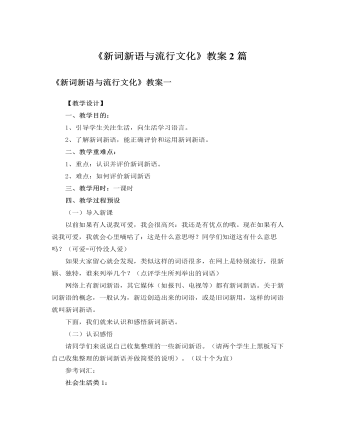
人教版高中语文必修1《新词新语与流行文化》教案2篇
【教学设计】一、教学目的:1、引导学生关注生活,向生活学习语言。2、了解新词新语,能正确评价和运用新词新语。二、教学重难点:1、重点:认识并评价新词新语。2、难点:如何评价新词新语三、教学用时:一课时四、教学过程预设(一)导入新课以前如果有人说我可爱,我会很高兴:我还是有优点的哦。现在如果有人说我可爱,我就会心里嘀咕了:这是什么意思呀?同学们知道这有什么意思吗?(可爱=可怜没人爱)如果大家留心就会发现,类似这样的词语很多,在网上是特别流行,很新颖、独特,谁来列举几个?(点评学生所列举出的词语)网络上有新词新语,其它媒体(如报刊、电视等)都有新词新语。关于新词新语的概念,一般认为,新近创造出来的词语,或是旧词新用,这样的词语就叫新词新语。
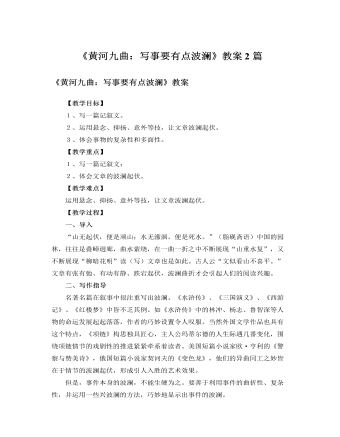
人教版高中语文必修1《黄河九曲:写事要有点波澜》教案2篇
1.悬念法悬念法又称关子。它是作者为了激发那种“紧张与期待的心理活动”,在行文中有意采取的一种积极而有效的手段。这种手段包括“设悬”和“解悬”两方面。所谓 “设悬”就是设置悬念,即在情节发生发展的关键时刻或人物命运攸关的重要关头,叙述戛然而止,转叙他事。从而引起读者强烈的寻根问底的兴趣。所谓“解悬” 也叫“释悬”,就是指在情节发展的特定阶段,通过矛盾的解决,揭示事情原委和人物命运的结局,使读者的期待心理得以满足。如《驿路梨花》,当人们正为露宿而发愁时出现了一间神秘的小屋,小屋的主人是谁呢?猜想间,有人来了,但也不是屋子主人,那小屋子的主人是谁呢?终于知道了小屋是解放军盖的,但为什么要盖这间小屋呢?这样“设悬——释悬——带出新悬念”,环环相扣、层层递进,使文章韵味无穷。
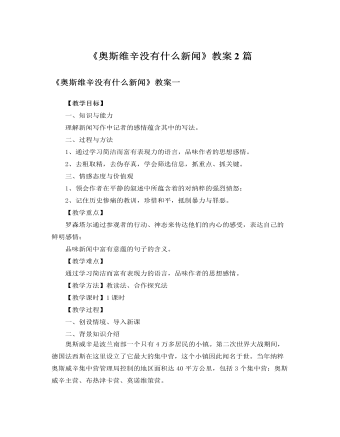
人教版高中语文必修1《奥斯维辛没有什么新闻》教案2篇
3.作者为什么不直接描写人们看见东西呢?请同学们找出其中的细节描写,并说明有什么表达效果。答:侧面烘托,正是作者高明之处,这也是许多佳作常用之法。细节描写往往会成为事情的切入点和突破口,一篇佳作往往离不开一些细节描写,本文也不例外,有些细节描写耐人寻味,如:“德国人撤退时炸毁的布热金卡毒气室和焚尸炉废墟上,雏菊花在怒放。”“这是一个二十多岁的姑娘,长得丰满,可爱,皮肤细白,金发碧眼。她在温和地微笑着,似乎是为着一个美好而又隐秘的梦想而微笑。”4.句子赏析:“对另外一些人来说,这样一个事实使他们终生难忘:在德国人撤退时炸毁的布热金卡毒气室和焚尸炉废墟上,雏菊花在怒放。”明确:一边是戕害生命的毒气室和焚尸炉,一边是生机勃勃的生命,两种反差极大的事物摆在一起。表达了作者对纳粹的讽刺:纳粹的残暴终归阻止不了生命的进程。同时也表达了作者的控诉:生命的绽放是人世间最美好的事情,对生命的戕害是最恶劣的罪行。
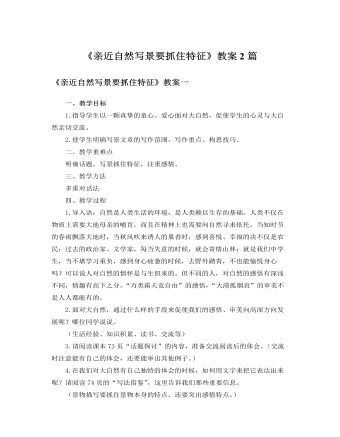
人教版高中语文必修2《亲近自然写景要抓住特征》教案2篇
一、教学目标1.指导学生以一颗真挚的童心、爱心面对大自然,促使学生的心灵与大自然亲切交流。2.使学生明确写景文章的写作范围、写作重点、构思技巧。二、教学重难点明确话题,写景抓住特征,注重感情。三、教学方法多重对话法四、教学过程1.导入语:自然是人类生活的环境,是人类赖以生存的基础。人类不仅在物质上需要大地母亲的哺育,而且在精神上也需要向自然寻求依托。当知时节的春雨飘落大地时,当秋风吹来诱人的果香时,感到喜悦、幸福的决不仅是农民;过去的政治家、文学家,每当失意的时候,就会寄情山林;就是我们中学生,当不堪学习重负,感到身心疲惫的时候,去野外踏青,不也能愉悦身心吗?可以说人对自然的情怀是与生俱来的。但不同的人,对自然的感悟有深浅不同,情趣有高下之分。“万类霜天竞自由”的感悟,“大漠孤烟直”的审美不是人人都能有的。2.面对大自然,通过什么样的手段来促使我们的感悟、审美向高深方向发展呢?哪位同学说说。
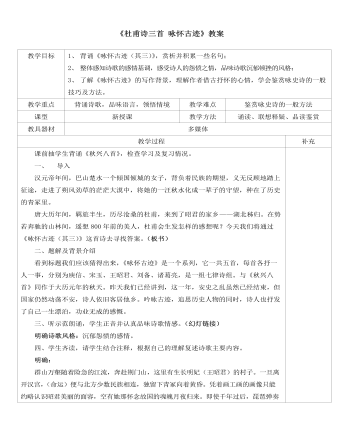
人教版高中语文必修3《杜甫诗三首 咏怀古迹》教案
“千载琵琶作胡语,分明怨恨曲中论。”“怨恨”两字点明全篇主旨。千百年来,琵琶所演奏的总是从匈奴传来的撩人愁思的胡乐,正是昭君在诉说着她的怨恨!这两句从侧面烘托昭君的形象,既有对她的赞扬,又有对她的同情。读到这里,我们的耳边好像又响起了那深沉、幽怨的琵琶声!5、这首诗写的是昭君的怨恨,但首联一开始并没有写她的怨恨,写的是什么?这样写的目的又是什么?明确:群山万壑赴荆门山是群山起伏,连绵不绝;水是万壑争流,奔腾不息,直赴荆门山。其中的“赴”字用了拟人的手法,把迤逦不绝的千山万壑陡然间写活了,既有飞动之势,又有变幻之姿。从侧面烘托昭君的形象。两千多年前,一个青年女子远离父母之邦,嫁到异域,并在那里度过一生,确实需要巨大的勇气和毅力,而这雄伟的山川简直就是她那坚强的性格的象征。6、佳句鉴赏(这首诗歌当中,我认为有两句诗写得非常美,我自己很喜欢,不知道有没有同道中人?)
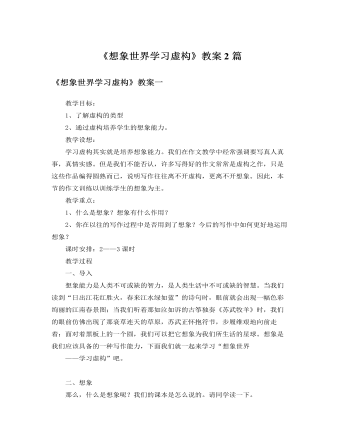
人教版高中语文必修2《想象世界学习虚构》教案2篇
虚构不等于说假话。它是一种源于生活,但高于生活的艺术真实。我们可以举个例子:我国公认的最权威最真实的史书是——《史记》,那么,大家认为《史记》里有没有虚构呢?有。必修一的《鸿门宴》里就有虚构。大家想:司马迁是哪个朝代的人?西汉汉武帝时。刘邦项羽是哪个朝代的?秦末时期。那司马迁不可能坐时光穿梭机到秦末去参加鸿门宴吧?既然他没不在场,那课文《鸿门宴》里人物的语言、动作、甚至是表情从何而来呢?对,是司马迁根据有限的史料加以补充,想象、虚构出来的。那么,同学们在写作文时,也可以不必拘泥于亲身经历的事情,毕竟生活是平淡的,毕竟大家的生活阅历也有限,有时候,我们发挥想象、虚构一个故事来反映生活的真实,也许更生动、也更典型。所以,近年来高考试卷中都提示考生:作文可以大胆想象,编写故事。按照编故事的方式不同,我们的虚构性作文又可以写哪些类型呢:小说,散文,童话,寓言,科幻,故事新编……
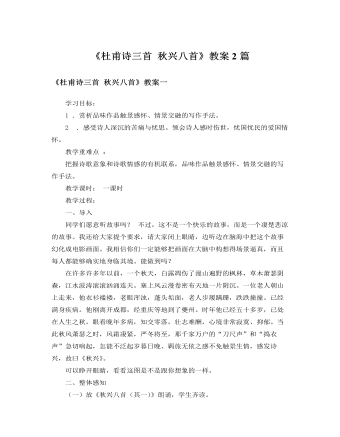
人教版高中语文必修3《杜甫诗三首 秋兴八首》教案2篇
4、主旨 哪一联明确地点明全诗题旨?表达了作者的什么感情?试做分析 颈联。 菊花开在秋天,所以这 “ 丛菊 ” 回应了诗题中那个 “ 秋 ” 字。 “ 他日 ” 可以指过去也可以指未来,在这里是指过去。“丛菊两开”,指诗人于 765 年离开成都,原打算很快出峡,但这年留居云安,次年又留居夔州,见到丛菊开了两次,还未出峡,故对菊掉泪。秋菊两度盛开,使诗人再次洒下往日流过的眼泪。“开”字双关,一谓菊花开,又言泪眼随之开。此时他仍然滞留在他乡,他始终没有放弃回乡的打算。孤舟可以系住,使其不能泛诸中流,但诗人的心是系不住的。他的心早已越过江河,越过关山,飞到了长安。所以,一叶靠岸系绳的孤舟,始终都牵动着诗人的故园之思。这一联是全篇诗意所在。孤舟本来只能系住自己的行踪,却把诗人的思乡之心也牢牢地系住了,故见舟伤心,引出故园之思,表现出思乡之情的深沉浓烈和欲归不得的无奈与凄伤,为文章的主旨句。
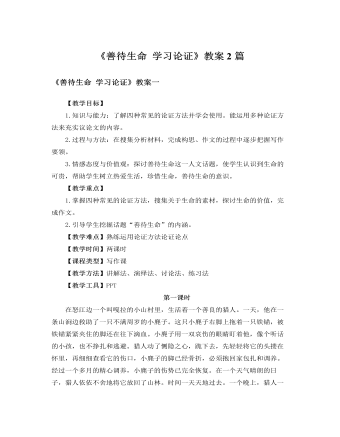
人教版高中语文必修3《善待生命 学习论证》教案2篇
论证方法之引证法如何用好引证法:1.所引用的名言警句等针对性要强。每句名言都产生于特定的背景,都应用于特定的交际目的,即使谈同一个问题,也有不少名言可供选取。2.要简洁,不宜过多。议论是在发表自己的见解而不是在介绍他人的见解。引用他人的话,目的是为了让读者更加信服自己的话。3.要注意直接引用和间接引用的区别。直接引用务求文字、甚至标点均准确无误;间接引用只须述其大意,但要注意人称的转换。论证方法之喻证法喻证法是用设喻来论证论点的方法。在议论文中,设喻可以使论点更易懂、更风趣、更容易获得读者的认同。喻证法能化抽象为具体、化艰深为浅显、化枯燥为生动。论证方法之喻证法如何用好喻证法:1.以小见大,就近取譬。要精选生活中细小的、人们熟悉的事物做为设喻的喻体。2.喻体不求形似,只求神似。做为喻证的喻体与做为比喻的喻体不同。比喻的喻体是为了强调特征,描绘事物,侧重形似,以形比形;而喻证的喻体是为了阐发观点,以正视听,力求神似,以义取形。
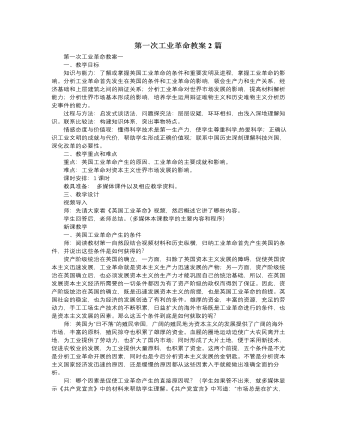
人教版高中历史必修2第一次工业革命教案2篇
一、教学目标知识与能力:了解或掌握英国工业革命的条件和重要发明及进程,掌握工业革命的影响。分析工业革命首先发生在英国的条件和工业革命的影响,领会生产力和生产关系,经济基础和上层建筑之间的辩证关系;分析工业革命对世界市场发展的影响,提高材料解析能力;分析世界市场基本形成的影响,培养学生运用辩证唯物主义和历史唯物主义分析历史事件的能力。过程与方法:启发式谈话法,问题探究法:层层设疑,环环相扣,由浅入深地理解知识。联系比较法:构建知识体系,突出事物特点。情感态度与价值观:懂得科学技术是第一生产力,使学生尊重科学,热爱科学;正确认识工业文明的成就与代价,帮助学生形成正确价值观;联系中国历史深刻理解科技兴国,深化改革的必要性。二、教学重点和难点重点:英国工业革命产生的原因、工业革命的主要成就和影响。难点:工业革命对资本主义世界市场发展的影响。课时安排:1课时教具准备: 多媒体课件以及相应教学资料。
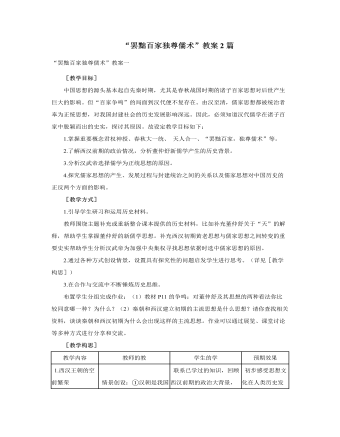
人教版高中历史必修3“罢黜百家独尊儒术”教案2篇
战国阴阳五行家邹衍认为,历史中的朝代更替是由于五德运行产生的影响。按照邹衍的学说,每个朝代必须与五德之一相连,因此,这个朝代就应当遵循这五德之一的要求来运转。董仲舒修改了这个理论,认为朝代的更替不是依循五德运行的顺序,而是依循“三统”,即黑统、白统、赤统的顺序。他在《三代改制质文》中说:每个朝代都依循一统,每统又各有其为政的系统。按董仲舒的说法,夏朝代表黑统,商朝代表白统;周朝则是赤统。夏、商、周三朝完成了这一历史循环。之后,历史又开始一次新的循环,新的朝代又应当代表黑统。继承周朝统治的既不是秦朝,也不是汉朝,而是孔子,他承受天命,创立了黑统。孔子所受天命,不是一种“法统”,而是一种“道统”。董仲舒说:“《春秋》大一统者,天地之常经,古今之通谊也。今师异道,人异论,百家殊方,指意不同,是以上亡以持一统;法制数变,下不知所守。臣愚以为诸不在六艺之科孔子之术者,皆绝其道,勿使并进。邪辟之说灭息,然后统纪可一而法度可明,民知所从矣。”

